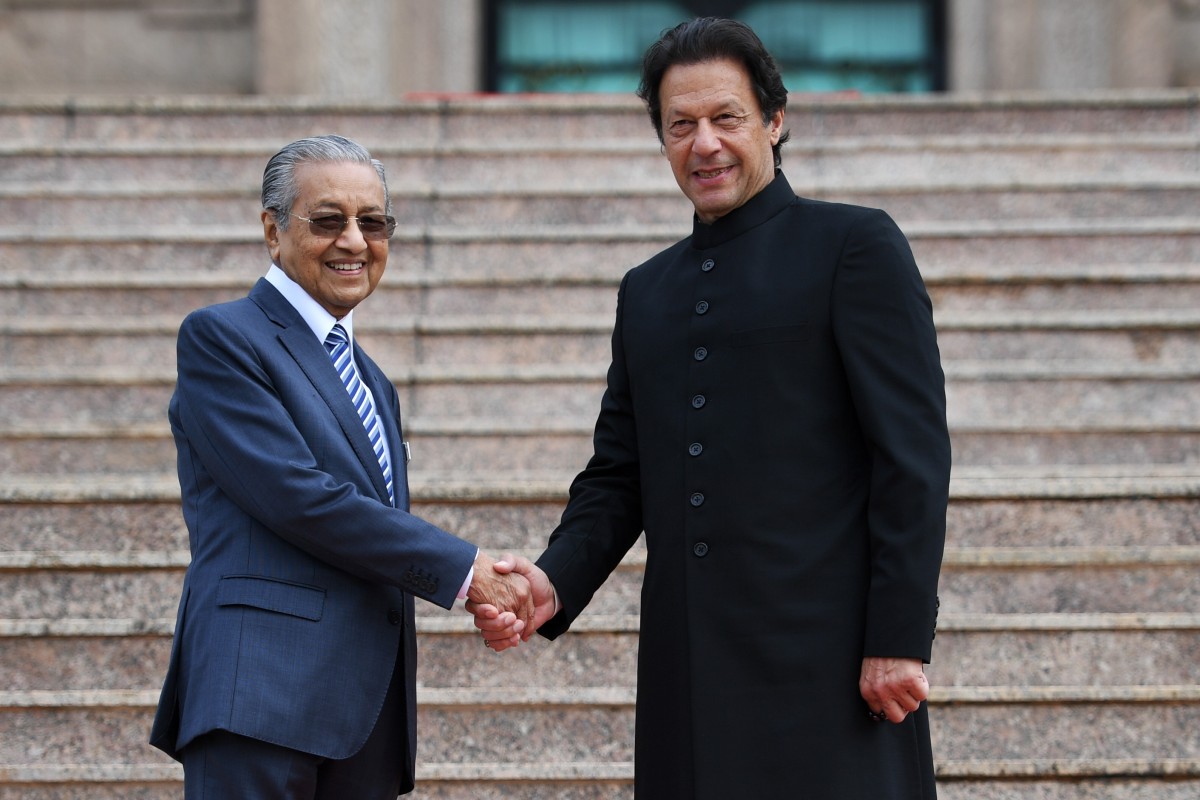- The KL Summit, a forum of Islamic countries, has been dealt a blow after Khan’s withdrawal
- The premier reportedly pulled out over the perception the summit was meant to replace the Riyadh-dominated Organisation of Islamic Cooperation

SCMP 17 Dec, 2019

Malaysia’s Prime Minister Mahathir Mohamad shakes hands with his Pakistani counterpart Imran Khan during a 2018 meeting in Putrajaya. Photo: AFPA highly anticipated three-day summit of Islamic countries that Malaysia was to host later this week was dealt a blow on Tuesday after Pakistani Prime Minister Imran Khan pulled out – purportedly under pressure from Saudi Arabia.The office of Malaysia’s Prime Minister Mahathir Mohamad in a statement said Khan had telephoned the 94-year-old leader to express his regret at not being able to attend the Kuala Lumpur Summit 2019.
The statement did not explain why Khan was withdrawing – the Pakistani leader had been touted as having thought up the idea of an expanded summit with Mahathir last year – but said the new event was not meant to replace the Organisation of Islamic Cooperation (OIC).
In a weekend visit to Saudi Arabia that Islamabad described as part of “regular exchanges”, Khan met with the powerful Crown Prince Mohammed bin Salman.
Multiple Pakistani media reports said Saudi Arabia had leaned on Khan to rethink his participation because of the perception that the KL Summit was meant to replace the OIC, which is traditionally dominated by Riyadh.
The murder of Altantuya Shaariibuu and allegations against Malaysia’s former PM Najib Razak
The summit “is a non-governmental organisation initiative, supported by the Malaysian government and is not intended to create a new bloc as alluded to by some of its critics”, the statement by Mahathir’s office said.SUBSCRIBE TO THIS WEEK IN ASIAGet updates direct to your inboxSUBMITBy registering, you agree to our T&C and Privacy Policy
“The summit is not a platform to discuss about religion or religious affairs but specifically to address the state of affairs of the Muslim ummah [community].”
Speculation had been rife about Saudi Arabia’s ambivalence over the KL Summit, especially because the leaders of Iran and Qatar – two of its key regional rivals – are among the top leaders slated to speak at the event.
Malaysian foreign minister Saifuddin Abdullah on November 19 visited Riyadh to meet his counterpart Prince Faisal bin Farhan al Saud and deliver a letter from Mahathir.
The veteran prime minister’s predecessor Najib Razak fostered close ties to Saudi Arabia during his 2009-2018 stint in power, but that relationship raised eyebrows because Najib – currently on trial for his links to corruption at the 1MDB state fund – said billions of ringgit in his personal accounts that are central to the case were in fact “political donations” from the Middle Eastern kingdom.
In contrast, while Mahathir has hosted Saudi Arabian officials since he came to power last year, he has not visited Riyadh.
Last week, he visited Qatar at the invitation of Sheikh Tamim Hamad Al Thani.
Saudi Arabia and its allies the United Arab Emirates, Bahrain and Egypt in June 2017 cut ties with Qatar and imposed a blockaded on it over claims that the tiny oil rich kingdom was a sponsor of terrorism – which Doha denies.
There have been signs of a thaw recently, and the Qatari Foreign Minister Sheikh Mohammed bin AbdulRahman al-Thani on Sunday told CNN the kingdom has “broken the stalemate of non-communication to starting a communication with the Saudis”.
In the case of Iran, Saudi Arabia and the Islamic republic have long been bitter rivals, with their feud partly fuelled by religious differences. Saudi Arabia is the world’s leading Sunni Muslim nation and is home to the faith’s two holiest sites, while Iran is largely Shia Muslim.
